The Diocese of Venice is mourning the death of Father Jerome “Jerry” P. Kaywell, who served as Pastor of Sacred Heart Parish in Punta Gorda since 2008. Father Kaywell passed away unexpectedly on Feb. 23, 2026, at the age of 72.
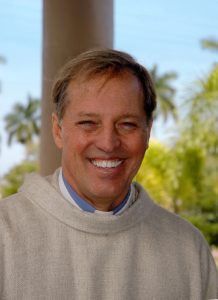
Bishop Frank J. Dewane expressed his profound sadness at the loss of Father Kaywell, who served in the Diocese of Venice for 35 years.
“Let us keep the soul of Father Jerry in our prayers. Father participated in many important moments in the pastoral and sacramental life of his parishioners. Baptisms, first communions, weddings, and funerals, he has been there for it all,” Bishop Dewane remarked. “He was a priest of many talents who shared his love for the Lord with all who knew him. May he rest in peace!”
Bishop Dewane also expresses his deepest condolences to Father Kaywell’s family as well as to the staff and parishioners of Sacred Heart Parish who, are also suffering from this great loss. “Know you are in my prayers during this difficult time, and may you find comfort in the knowledge that Father Jerry is now on his journey to Our Lord.”
Father Kaywell was appointed Administrator of Sacred Heart Parish in 2004 and that same year the Parish church was destroyed by Hurricane Charley. Father quickly took on the necessary work for rebuilding the church, including hosting a benefit concert and creating an album “After Charley,” which raised funds for the Parish’s and community’s hurricane recovery. A new church was dedicated and blessed by Bishop Dewane on Nov. 23, 2008, and at that time Father Kaywell was named Pastor. In 2022, during Hurricane Ian, the Parish Center and rectory were flooded and suffered severe damage which took nearly two years to repair.
Parishioners of Sacred Heart posted messages of condolence on social media, with many remembering how Father Kaywell was so full of life and joy as well as for always having a smile. Known for his two great passions in life, many stated how generous he was in sharing his love of God as well as for his broad musical talents.
Born in 1953 in West Palm Beach, and one of five children, Father Kaywell discerned early in life a religious vocation, entering a Franciscan monastery at age 17, first graduating from St. Francis College in Loretto, Pennsylvania, and then studying at St. Francis Seminary, also in Loretto. In 1975, he left religious life shortly after releasing his first album to perform in a band with his brother, eventually moving to California, where he was involved in youth ministry and professional songwriting for advertising and television for more than a decade.
The future Father Kaywell then returned to seminary in 1984 at which time he was diagnosed with lymphatic cancer. While battling cancer, he managed to record the 1986 Grammy-winning gospel album “Let My People Go” with The Winans.
He then continued his studies at St. Vincent de Paul Regional Seminary in Boynton Beach and was ordained on Oct. 25, 1991, at Epiphany Cathedral in Venice. Father Kaywell served as Parochial Vicar at St. Andrew Parish in Cape Coral from 1991-1998, then as Parochial Vicar at St. John the Evangelist Parish in Naples from 1999-2004, before his appointment to Sacred Heart.
Father Kaywell was St. Vincent de Paul Society Chaplain for the Sacred Heart Conference. In his early years as a priest, Father performed at concerts to help raise money for Catholic education throughout the Diocese. Father Kaywell continued to produce music while a priest and released his latest album in 2020.
Father Kaywell is survived by two sisters, two brothers and numerous nieces and nephews.
Visitation will take place 4-7 p.m., Wednesday, March 11, at Sacred Heart Parish, 211 W. Charlotte Ave., Punta Gorda. A Mass of Christian Burial will take place at 10 a.m., March 12.
Please pray for the repose of the soul of Father Jerome Kaywell and the consolation of his family. May the souls of all the faithful departed, through the mercy of God, rest in peace.






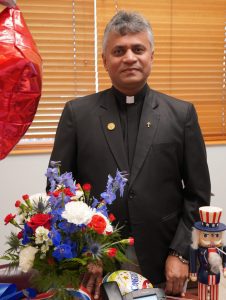
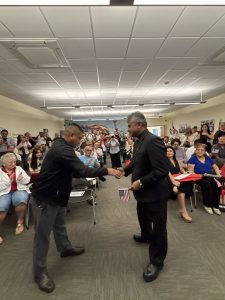


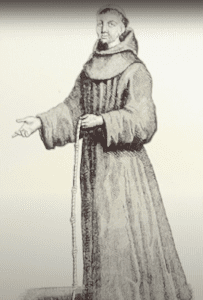 Lynn Mangan, Vice Postulator for the Cause for La Florida Martyrs, said the “beautiful martyrdom event that took place in the fall of 1696 near or in the Diocese of Venice. The exact location has not been identified by archaeologists. There are five proposed martyrs, Servants of God, in this event, who, along with the other Martyrs of La Florida, are under review in the Roman Phase by the Dicastery of the Causes of Saints.”
Lynn Mangan, Vice Postulator for the Cause for La Florida Martyrs, said the “beautiful martyrdom event that took place in the fall of 1696 near or in the Diocese of Venice. The exact location has not been identified by archaeologists. There are five proposed martyrs, Servants of God, in this event, who, along with the other Martyrs of La Florida, are under review in the Roman Phase by the Dicastery of the Causes of Saints.”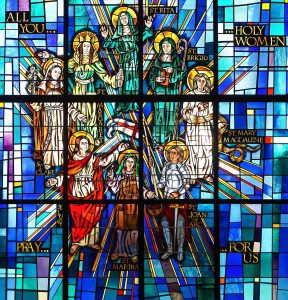 The Bishop explained how St. Pope Gregory III established the modern-day All Saints Day early in the 8th century and stressed the need to begin the vigil for the solemnity the day before, thus creating All Hallows Eve.
The Bishop explained how St. Pope Gregory III established the modern-day All Saints Day early in the 8th century and stressed the need to begin the vigil for the solemnity the day before, thus creating All Hallows Eve.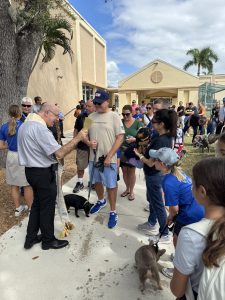
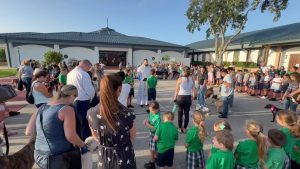
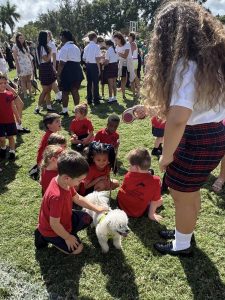
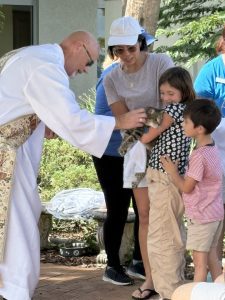
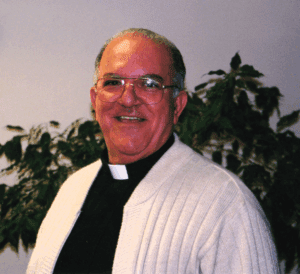 On September 30, 1946, Father Normando Feliz was born in Barahona, Dominican Republic, to Braudilio Feliz and Alida Mustafa. After receiving his education at St. Thomas Aquinas Seminary, Santo Domingo, Dominican Republic; and the Pontifical Institute of Liturgy, Rome. Father Feliz was ordained on January 11, 1975, in Santo Domingo. Father served in the Dominican Republic as a Navy Chaplain, Pastor, and Seminary Professor of Liturgy, English and Spanish. Father Normando has served in the Diocese of Venice since January 1987 and was incardinated into the Diocese on April 10, 1990. His official appointments included Parochial Vicar at St. Paul Parish, Arcadia, and St. Andrew Parish, Cape Coral; and Pastor of Our Lady Queen of Heaven Parish, LaBelle, and Sacred Heart Parish, Bradenton. From 2000 to 2002 Father Feliz took a sabbatical for Scripture and Theology Studies and Graduate Studies in Canon Law. Between 2002 to 2004, Father served as Diocesan Director of the Department of Ministries. From August 2004 until his retirement in November 2008, Father Feliz served as Pastor of St. Peter the Apostle Parish in Naples.
On September 30, 1946, Father Normando Feliz was born in Barahona, Dominican Republic, to Braudilio Feliz and Alida Mustafa. After receiving his education at St. Thomas Aquinas Seminary, Santo Domingo, Dominican Republic; and the Pontifical Institute of Liturgy, Rome. Father Feliz was ordained on January 11, 1975, in Santo Domingo. Father served in the Dominican Republic as a Navy Chaplain, Pastor, and Seminary Professor of Liturgy, English and Spanish. Father Normando has served in the Diocese of Venice since January 1987 and was incardinated into the Diocese on April 10, 1990. His official appointments included Parochial Vicar at St. Paul Parish, Arcadia, and St. Andrew Parish, Cape Coral; and Pastor of Our Lady Queen of Heaven Parish, LaBelle, and Sacred Heart Parish, Bradenton. From 2000 to 2002 Father Feliz took a sabbatical for Scripture and Theology Studies and Graduate Studies in Canon Law. Between 2002 to 2004, Father served as Diocesan Director of the Department of Ministries. From August 2004 until his retirement in November 2008, Father Feliz served as Pastor of St. Peter the Apostle Parish in Naples.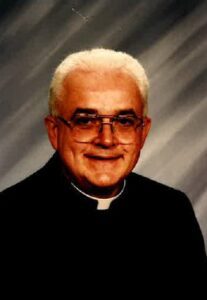
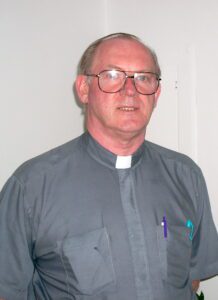
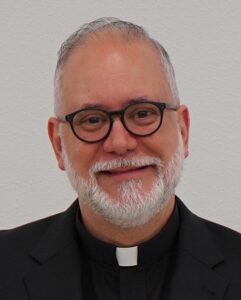
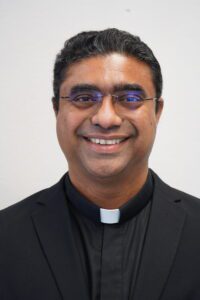
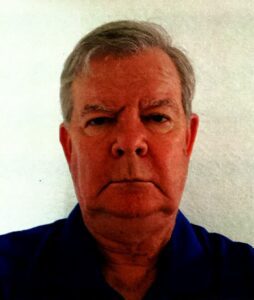
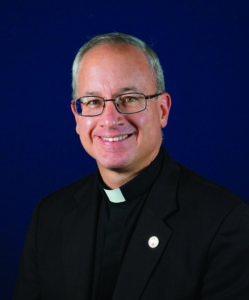
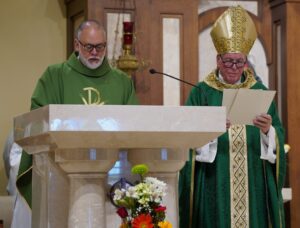
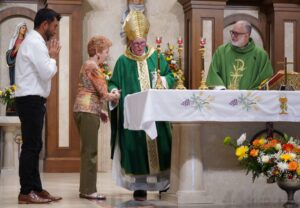
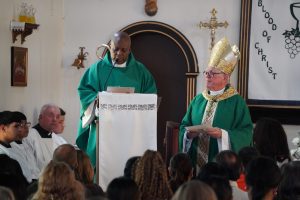
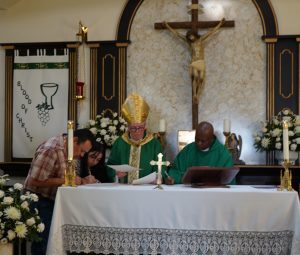 Bishop Dewane initiated the installation process by calling Father Woady to the ambo following the homily. Father then recited an Oath of Fidelity in which he promises to “adhere to the teachings, which either the Roman Pontiff or the college of bishops enunciate when they exercise authentic magisterium.” Father Woady then recited, along with the faithful, the profession of faith, including additional parts solely for him. The installation also included prayers to provide the new Pastor the wisdom and guidance from the Holy Spirit to lead the Parish.
Bishop Dewane initiated the installation process by calling Father Woady to the ambo following the homily. Father then recited an Oath of Fidelity in which he promises to “adhere to the teachings, which either the Roman Pontiff or the college of bishops enunciate when they exercise authentic magisterium.” Father Woady then recited, along with the faithful, the profession of faith, including additional parts solely for him. The installation also included prayers to provide the new Pastor the wisdom and guidance from the Holy Spirit to lead the Parish.